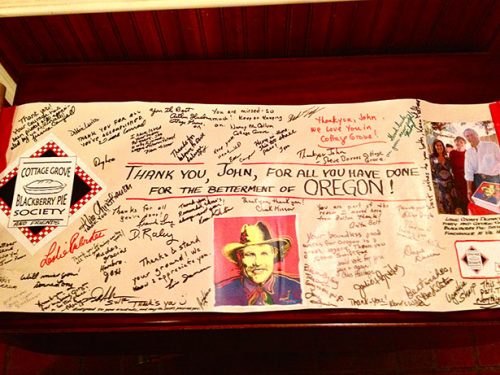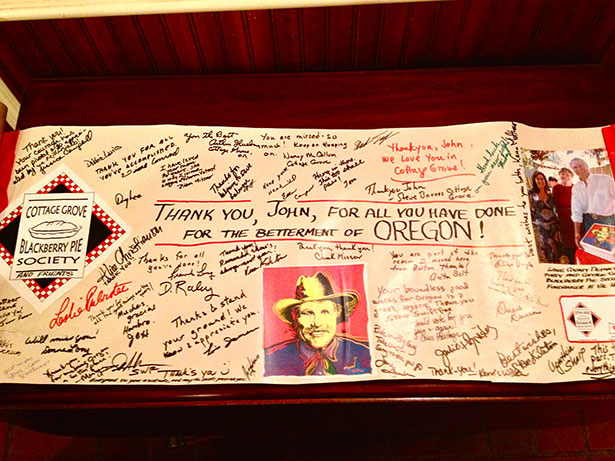
OCCUPATIONAL DISEASE
I taught and counseled delinquent adolescents for 28 years. Some grew up to be politicians. Most of the others were successfully rehabilitated. Don’t get me wrong, I’m not condemning all politicians; some of them are very decent, dedicated public servants — working to promote the wellbeing of us all. It’s just that the 99 percent give the other 1 percent a bad name.
There, now that I’ve got a few cheap shots out of my system, I feel much better. But really, must these folks live the cliché “power corrupts”?
Too frequently, politicians’ initial desire to “do good” isn’t strong enough to resist the temptations which come with power and influence. “Oh Lord, it’s hard to be humble when you’re perfect in every way.” And the sycophants surrounding politicians spent every waking hour (and, yes, sometimes more) telling politicians how wonderful they are. Contradict the “great one” or criticize him or her (or his or her fiancé) and you’d better update your resume.
Generally politicians are only held accountable when it’s too late, when their accumulated transgressions are so great and/or so many that they can no longer be hidden and public exposure dooms their political careers.
John Kitzhaber is far from the first and, unfortunately, will be far from the last such politician to suffer from the occupational disease of excessive hubris.
I wish Kitzhaber the best in his post-political life and, if I had the power, would grant him a “mulligan” in his choice of girlfriends.
Gary Crum, Junction City
 |
| This large thank-you card will be sent to John Kitzhaber from the Cottage Grove Blackberry Pie Society |
POT AND RECOVERY
In a letter to the editor Feb. 12 titled, “Stoned & Happy,” Joe Canfield of Eugene reported he has been smoking marijuana in his ShelterCare apartment for more than two years. It is important for me to provide EW readers clarification on ShelterCare’s policy concerning the use of medical marijuana by its program participants.
Use of marijuana, including prescribed marijuana by a physician, is prohibited on all ShelterCare property, as is storage of the product and associated paraphernalia. Our rationale behind the policy is based on our belief that exposure to medical marijuana and associated paraphernalia threatens the sobriety of many of our clients in recovery from addiction to drugs and alcohol. Medical marijuana use and those in recovery simply are not a good mix.
For clients who provide ShelterCare staff with a prescription for medical marijuana from their physician, we work with them to find alternative locations to use and store their prescription and paraphernalia. We also expect clients using medical marijuana to refrain from contact with ShelterCare program participants while they are under the influence of marijuana or smell of marijuana smoke.
ShelterCare’s no-smoking policy is not limited to medical marijuana. Smoking tobacco or any other legal or illegal substance is also prohibited on our agency’s property.
Our team takes its responsibility to help clients heal physically and mentally very seriously. The use of medical marijuana can help some clients, but ShelterCare will not allow medical marijuana use to threaten the sobriety of fellow program participants.
Susan Ban, Executive Director, ShelterCare
ARCHAIC SHELTER
I volunteer at the First Avenue Animal Shelter in Eugene. Recently, I learned that as part of Eugene’s 2016-2021 Capital Improvement Program, a new animal shelter is being considered.
This rectification is long overdue. The archaic configuration can be dangerous to volunteers and staff. Small concrete kennels are in two rows where dogs face each other with a 5-foot walkway in the middle. This causes dogs to constantly bark and growl at each other. The public uses this walkway to view the dogs for possible adoption. The noise and anxiety produced does not lend itself to a good experience with the dog.
The raised stress level of dogs means staff and volunteers are put at unnecessary risk when entering kennels to take dogs out for a walk or for a potty break.
Twelve years ago a task force delivered a report stating an immediate need for 30 more kennels at the current facility. I do not believe there has been any change to date.
I ask readers to: Go visit, ask questions and tell your city councilor and county commissioner that our community should have an animal shelter that shows we care about our pets!
SueAnn Schoeler, Eugene
TIME TO BARK AND HISS
I’m a former First Avenue volunteer dog walker. Truth is, the facility’s awful. It’s crowded. It’s loud. It stinks. Pure bedlam. You won’t find a “best of show” in this place, just a horror show. I couldn’t handle the truth, so I left. Being human, I had that option.
Struggling animals don’t have a choice. They’re stuck. They need a decent space to get healthy, feel safe, grow calm and have a shot at adoption. They need a new shelter. People need to act to make it so. Not to do so would be an inhumane act in a humane society.
So bark and hiss at policymakers: Do your duty. Build a new shelter. Make it all better. Then we’ll nuzzle and purr.
Benton Elliott, Eugene
CAR-CENTRIC CULTURE
The speeding highway that is Main Street in Springfield is unacceptable, having just claimed another three children Feb. 22, and perhaps killed the woman who was trying to cross with them too — she’s in critical condition.
I was upset about speeding traffic anyway since my wife and I just returned from a family visit to southeast Florida. We spent two weeks with a rental car along the coast from Jacksonville to Fort Lauderdale. But I observed no pedestrian/automobile conflict in this part of Florida — no conflict because the cars and trucks have won out entirely.
Newer towns had no sidewalks and as a rule no pedestrians. City streets, not just “arterials,” were six to 10 lanes wide and when not clogged to a standstill, flooded with fast moving traffic. The giant streets penned in the showy private gated “communities.” Just one street bicyclist, a dark-skinned man was spotted near the “inter-coastal” mansions where the Hispanic immigrants landscape theMcMansions for snowbirds and retirees. This man stood motionless beside his outdated bike like a human signpost, stuck on a mid-street island between four lanes of 50 MPH traffic. The hundreds of motorists were no doubt shaking their heads as they zipped by him: “Who would be idiotic enough or desperate enough to try to cross the street on a rickety old bicycle?”
Other complaints about Florida: It was warm enough to swim in the Ocean only one day. Because of CO2 climate crisis weather (something Floridians don’t believe in), the temperature in West Palm Beach dropped to 29 degrees while we were there. One could only find stores in malls surrounded by salt flat-sized parking lots, “outlets” from corporate chains that shrink-wrapped the fresh vegetables and sold pens, screws or nails only in pilfer-resistant, overkill-sized packets. Home again now, I savor our more human, less corporate Willamette Valley community. But I know that car-centric, corporatized Florida culture is only Southern California on steroids, and is likely to further infest Oregon unless we remain vigilant.
Let’s start by demanding that the state Department of Transportation cut the 45 MPH speed limit on the east end of the Springfield main street — 30 MPH would be much more reasonable. I would also love to see bicycles get a fighting chance on Willamette Street in south Eugene.
Ralph McDonald, Eugene
COST OF DIRTY ENERGY
Regarding biomass vs. environmental justice issues: “Thinking outside the box — isn’t that what we want to do in Eugene?” says Lisa Arkin of Beyond Toxics. That is exactly what I want from Eugene! These problems of environmental justice cannot be tolerated within this city, and these problems are only being caused by use of dirty energy. If we can move away from these fossil fuels, take away the sources of terrible pollutants they encounter every day by thinking outside the box, we could make lives better for everyone in Eugene.
We can look to so many other sources for energy, sources such as wind and solar! Solar energy is not being used as much as it could be in this city and in this state, and it would really help to better people’s lives. I’m very glad that these issues are being talked about because they are so important to me and to my life here in Eugene. Thank you very much for writing about these developments.
Caitlin Feely, Eugene
A MATTER OF TIME
Last week there were three fossil fuel explosions in the U.S. and one in Canada. What is your “threshold” for allowing corporate private profits to damage your clean water, air and food? Oh, hasn’t happened in Oregon yet? It will if the two proposed fracked gas export pipelines and terminals are allowed. It is my belief most Oregonians do not want these projects, but how can we stop them?
Our politicians have been purchased by special interest campaign contributions and our environmental regulatory agencies have been captured by the fossil fuel industry. There is money power and there is people power. Join the movement to stop the fracked gas export terminals in Oregon. Take the Pledge of Resistance at OregonPledgeofResistance@gmail.com for more information.
Deb McGee, Eugene